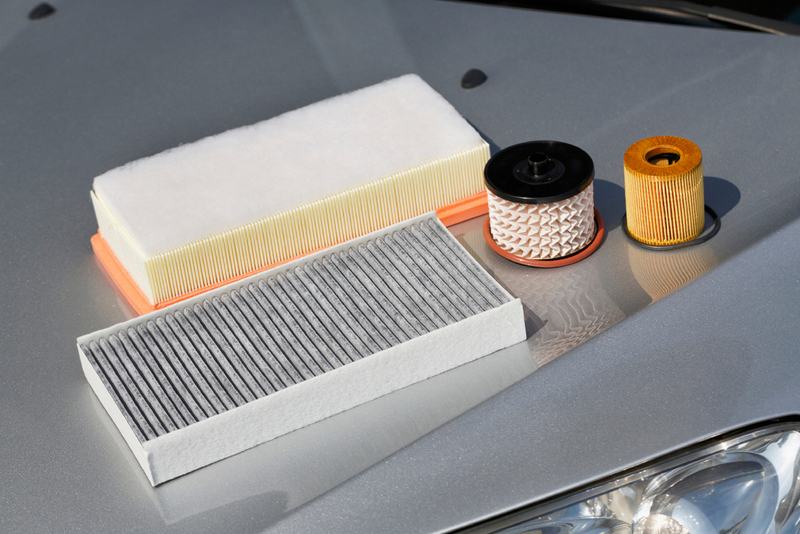Expert advice: filtration
Filters ensure the proper functioning of your car. A faulty or clogged filter can lead to some problems for your vehicle. What are the different filters? How to identify the signs of failure and when to change them? Cabin filter, air filter, oil filter and fuel filter: here is Klaxcar’s expert advice on filters.

What are the main car filters?
Cars have four main filters. These are the cabin filter, oil filter, fuel filter and air filter. Each fulfills a specific mission. They filter out impurities (dirt, dust, particles, etc.) that can clog the vehicle. That's why it's important to replace the filters at the right time not to affect the mechanics. Let's take a closer look at each of these filters.
The cabin filter
The role of the cabin filter is to purify the air injected into the cabin by the air conditioning, ventilation and heating system. The cabin filter has a sanitizing function so that passengers can breathe fresh air at all times. Even more so if you have breathing problems or suffer from allergies. In addition to capturing pollen, dust, bacteria and other fine substances and particles, an activated carbon cabin filter also filters exhaust gases.
If you notice airborne particles in the cabin or difficulty breathing normally, it's time to change this filter. What's more, a clogged cabin filter can create visibility problems on the road. The reason is because it disturbs the supply of clean air into the cabin. In general, it is estimated that a cabin filter needs to be replaced every 15,000 km and at least once a year. If you're essentially urban driving, the cabin filter replacement interval drops to 6 months or 10,000 km. The air in the city is much more polluted.
Be aware that a well-maintained and regularly replaced cabin filter also maximizes your heating and air conditioning service life!
The air filter
The air filter retains dust and pollutants in the air that arrives in the engine. It also prevents insects, sand and any foreign substance that may harm the mechanics. The filter material that makes up the air filter is made of cotton, foam or synthetic paper. The air filter also ensures that the vehicle's performance is optimised thanks to the right mix of air and fuel. There are different forms of air filter: round, cylindrical or rectangular models.
A vehicle that emits black smoke is a sign of a dirty air filter that must be changed quickly. If you notice that your car is consuming more fuel, it can also be a failure symptom. Indeed, a high-performance air filter allows better combustion and reduces fuel consumption. Most manufacturers recommend replacing the air filter every 20,000 km and at least once a year. If you drive mostly in the city or on dusty roads, the air filter replacement interval will be shorter.
The oil filter
The oil filter removes dirt and other metal particles present in the engine oil. In a word, its purification action allows the proper functioning of the engine oil. A dirty oil filter no longer removes impurities and accelerates the engine wear process. Power losses or even engine failure may occur.
Generally, the oil filter should be changed at each oil drain. In other words, every 15,000 km for a diesel engine and every 10,000 km for a petrol engine. Some manufacturers may provide specific replacement intervals depending on the model. You can read the vehicle's manual for more details.
The fuel filter
The fourth and final filter, the fuel filter filters out all the impurities that accumulate in the fuel – including dust and rust. The removal of these harmful and polluting particles helps to better protect and conserve fuel injectors. The fuel filter has a crucial role to play in preserving the performance of the engine and maximizing its service life. It is often considered the most important of the four filters, especially for diesel engines.
A clogged fuel filter means reduced flow. As a result, refuelling the engine becomes difficult and the vehicle loses performance. The main symptoms of replacing a fuel filter are repeated stalls, choppy accelerations, and problems with starting. To avoid any problems, consider replacing your fuel filter every 50 to 60,000 km for a diesel, and every 80 to 100,000 km for a gasoline.
Klaxcar references and their advantages over other filter brands
From Bosch to Mann-Filter via Purflux and Mahle, there are several filter brands on the market. Where is Klaxcar’s difference compared to competitors? On the side of selection and value for money. Klaxcar offers you a complete range of air filters, fuel filters, oil filters and cabin filters at the best price. Should you need some advice to make a better choice, the Klaxcar team is at your service!

